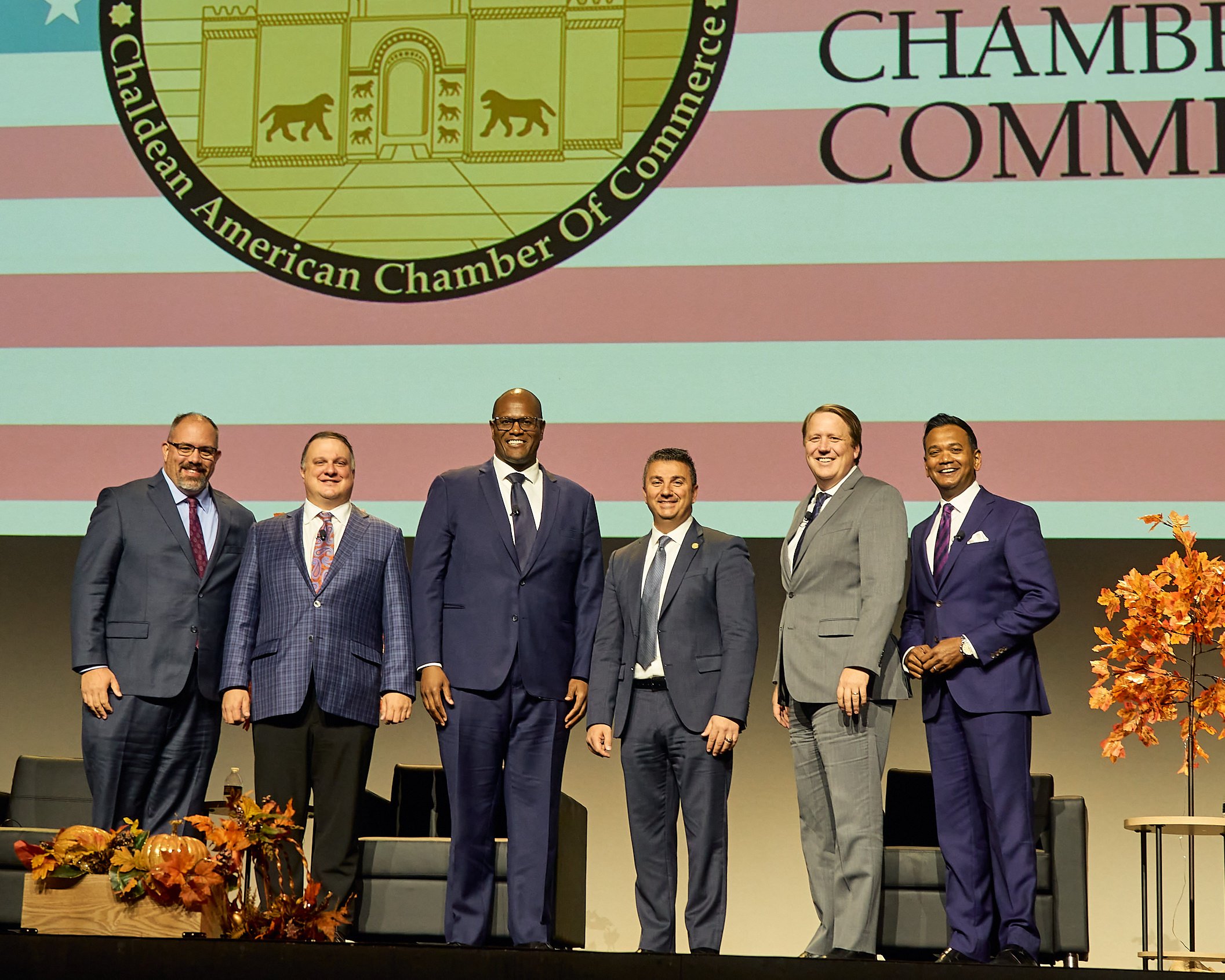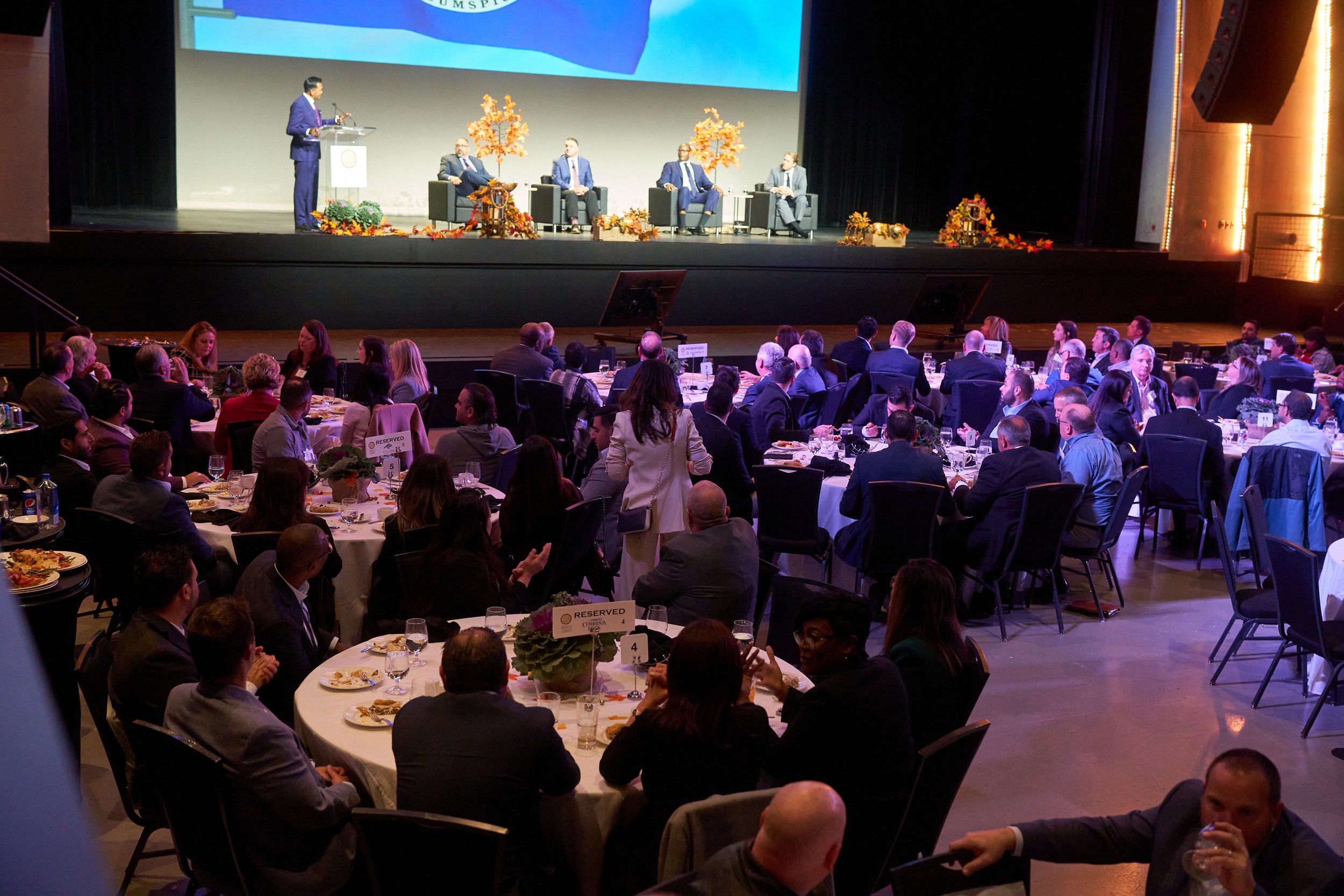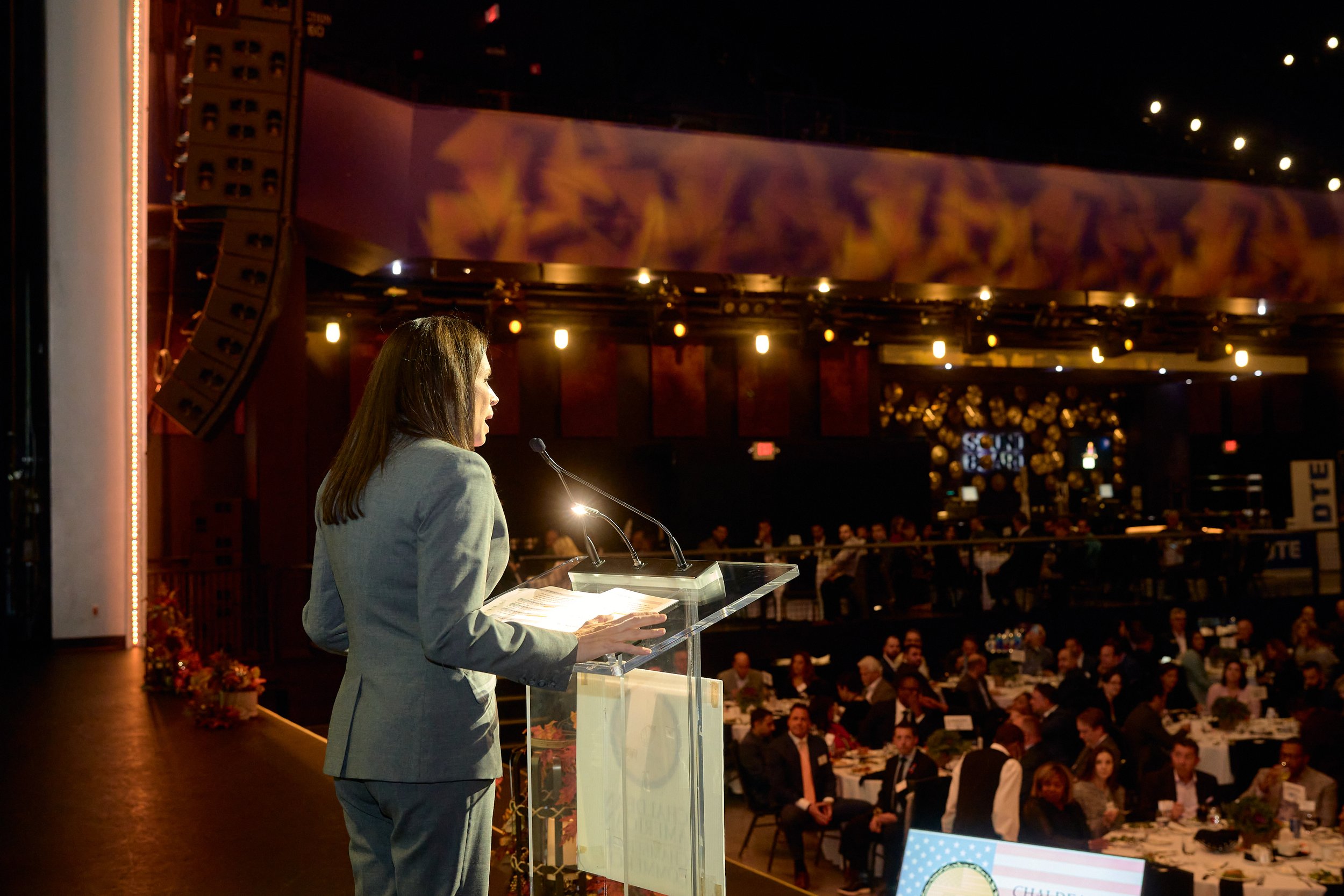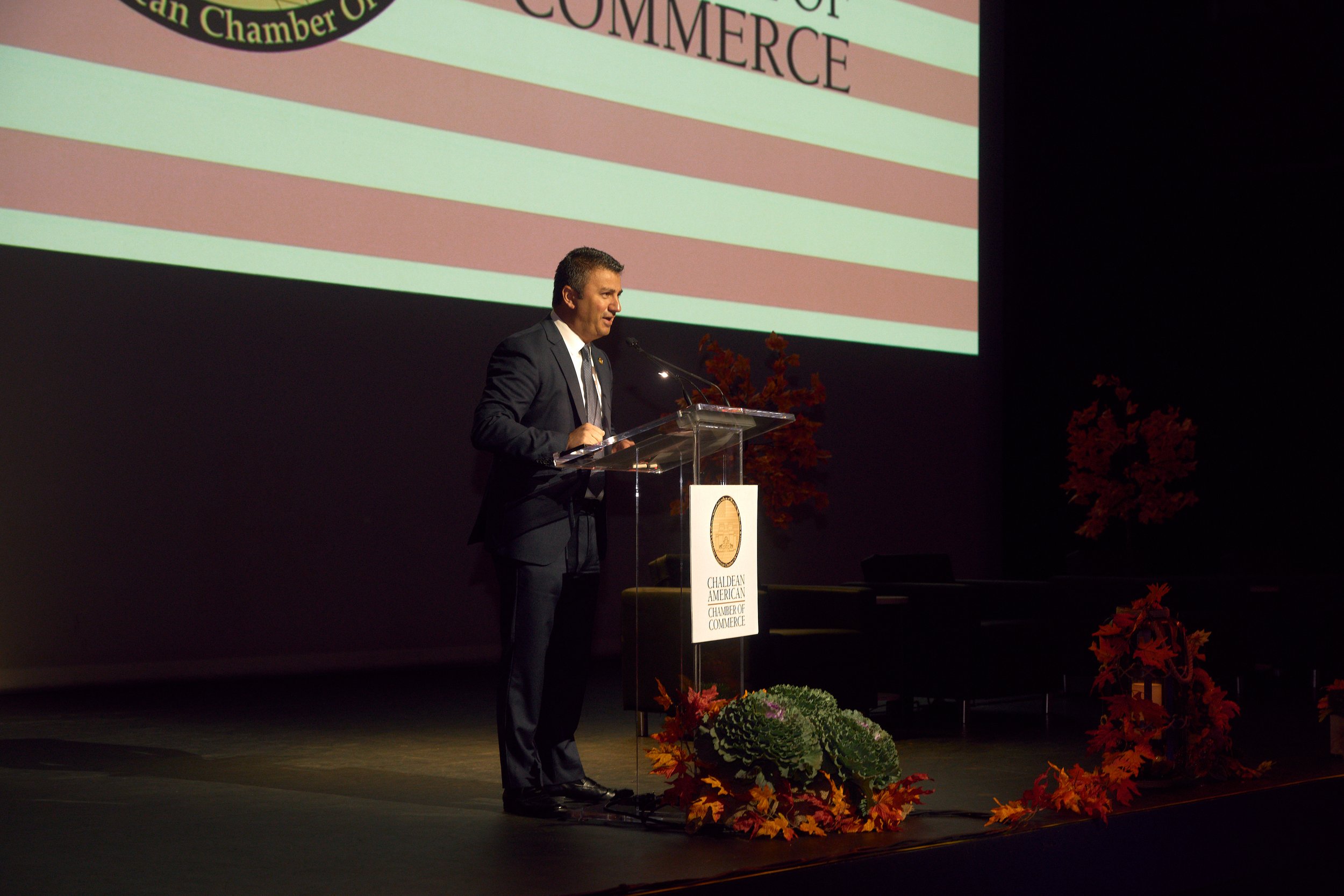Business as Usual: The Chaldean Chamber’s 16th annual business forum





Photos by Nico Salgado
By Sarah Kittle
On Friday, October 14, the Chaldean American Chamber of Commerce (CACC) hosted its 16th annual Business Luncheon at the MotorCity Casino Hotel in downtown Detroit. Approximately 250 community leaders, businesspeople, and dignitaries filled the tables inside the Sound Board Theater and prepared for a discussion about politics and the upcoming elections in Michigan.
Taking place the day after the first gubernatorial debate between Democratic Governor Gretchen Whitmer and Republican opponent Tudor Dixon, the event crowd was ready for some serious conversation.
In his welcome, Chamber president Martin Manna said, “We timed this perfectly to have a discussion about what happened last night.”
Standing backstage was Mrs. Tudor Dixon, Republican candidate for governor of Michigan. Sitting up front, waiting his turn to talk, sat the tall figure of Lieutenant Governor Garlin Gilchrist II.
The Chamber, which is nonpartisan, invited elected officials – a senator and a representative from each political party – to sit on a panel onstage. The organization’s mission of “building business, building relationships, and building community” transcends political hubris. Explains Manna, “We might have different views, but we are all American.”
The Roop Stuff
Of Indian descent, moderator Roop Raj was mis-recognized in the parking lot as Shri Thanedar, a freshman Congressman who represents parts of Detroit. Roop opened with that story, knowing that his Chaldean audience would understand being mistaken for someone else.
The business luncheon was the first for Roop, a TV anchor whom Manna referred to as “the new man in charge” at FOX 2 in Detroit. Roop well represented the bipartisan spirit of the Chamber and the event, sporting a striped, purple tie. The Chaldean community and Roop also share an entrepreneurial spirit; he produced his first TV show at age 14.
With solemnity and seriousness, Roop stressed the importance of political dialogue, stating, “Democracy is only supported by open, honest conversation.” Listening is an important component to any discussion, and voters need to hear both sides. The anchor was excited to be participating in an inclusive talk and was prepared to keep it civil and keep it going.
“It’s our job to tell you both sides,” Roop reminded the audience. “You’re not always going to like it.”
In politics as in religion, there are often many different opposing viewpoints. We don’t always have to agree with each other but listening and understanding another’s position helps to find common ground.
“We’ve got to respect each other more than we have been currently,” states Roop earnestly.
Opening remarks
Tudor Dixon made a good impression, coming across as warm and friendly. She shared a story about when she told her kids she was thinking of running for governor of Michigan. Her 7-year-old (going on 40) daughter asked her, “If you do this, are a lot of people going to hate you?” To which Dixon replied, “Well, we’re hoping less than 50 percent.”
Claiming children, who she says are in crisis, as her inspiration, Dixon said she wanted “to get back to basics in Michigan” so our kids have a better chance to succeed. That and the economy were her main topics in her three and a half minute remarks.
If Dixon’s remarks were refreshingly positive, Lt. Gov. Garlin Gilchrist II’s were positively glowing.
“I’m excited to be here,” said Gilchrist in his opening remarks. “We have an opportunity in Michigan to have a conversation about how we move our communities forward, and that does not need to be a destructive conversation.”
He personally thanked the Chamber leaders and the Chaldean Community Foundation (CCF) leaders by name, saying that they were community builders. The Lt. Gov. went on to say that the CACC and CCF invested in people, in their success and futures, and that he hoped every leader on every level in Michigan would follow their example.
Gilchrist went through a list of issues his administration and the CACC and CCF had worked on together, including state lottery commissions and liquor law—issues which have yet to be resolved and which would be brought up again by Manna during the panelists’ Q&A session with the audience.
The Panelists
The panel was composed of two members of Michigan Senate, Senator Jim Ananich (D) and Senator Aric Nesbitt (R), and two members of the House, Representative Matt Hall (R) and Representative Joe Tate (D).
After bringing the panelists onto the stage in alphabetical order, Roop went right to the main issue on the attendee’s minds: the economy and threat of recession. “We are headed into a rough patch… and after the election is over with, we need to really find common ground,” said Senator Jim Ananich, who went on to say he shared the stage with “tremendous leaders.”
The words of praise from across the aisle seemed to surprise Representative Matt Hall, whom Ananich called “very smart” and “dedicated.” Ananich gave a countdown of his days left in the legislature (78), stressed the importance of supporting and investing in infrastructure, and basically passed the torch to his fellow panelists and the “table in front,” a Blue Cross Blue Shield of Michigan-sponsored table full of congressional members.
“There are obviously things that have to be said and done in an election, “said Ananich. “it’s part of the business we’re in. But, starting in January, we can come together, really solve some of the issues we’re talking about.”
“After the election” was a phrase heard often that afternoon. And distressingly too many failed bills were waved in the faces of the audience. Even when pointedly asked, “What will YOU, personally, do to make sure things move forward?”, no one on the stage had a firm reply.
State(s) of the state
As with any political discussion featuring opposite sides, there was some backbiting and finger pointing. Too much time was spent blaming the other party for things that didn’t get done.
Roop Raj raised the point that political ads showcased very different viewpoints of the state of our state. If you listen to one side, the Republicans, “everything is in shambles, the economy’s a mess, and we’re never going to get out of it,” and the other side—the Democratic administration in charge— is saying we’re experiencing “job growth, and all these great things are happening.”
Although the sentiments are diametrically opposed, there is a chance that both may hold some truths. Much like we are encouraged to shy away from single-issue voting, we as voters need to analyze the candidates who will best represent our varying views and focus on the things we can agree upon.
Maybe then we can return to civil debate. In the meantime, it’s business as usual.
